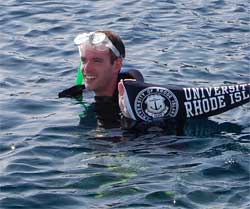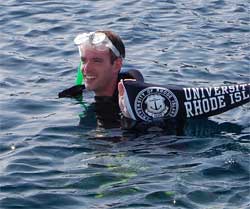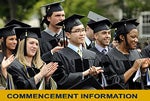 NARRAGANSETT, R.I. – May 7, 2012 – Michael Brennan was first introduced to noted marine explorer Robert Ballard when, as a freshman in high school, he was chosen to join Ballard on a weeklong science program at Yellowstone National Park through the JASON Project.
NARRAGANSETT, R.I. – May 7, 2012 – Michael Brennan was first introduced to noted marine explorer Robert Ballard when, as a freshman in high school, he was chosen to join Ballard on a weeklong science program at Yellowstone National Park through the JASON Project.
That experience led him on a circuitous path that resulted in Brennan becoming one of the first graduate students in Ballard’s Archaeological Oceanography program at the University of Rhode Island’s Graduate School of Oceanography, from which he will graduate on May 19.
“I first thought about studying marine geology, then Roman archaeology, and then I got interested in Mesoamerican archaeology as an undergraduate at Bowdoin,” recalls Brennan, who grew up in Avon, Conn. “I had been in touch with Bob off and on after Yellowstone, and then I got a random email from him in 2003 saying he was starting the program at URI and encouraging me to apply. It was nice to be remembered.”
The man who found the Titanic quickly incorporated Brennan into his research team, and he has played an important role in Ballard’s annual research expeditions to the Black Sea and Aegean Sea since 2006, finding and studying shipwreck sites and studying the environmental parameters of the sites.
“My very first expedition was a case of drop you on the ship and see what happens,” Brennan said. “He told me to navigate and to process data, so I really had to learn on the go. We found a lot of modern debris on that trip. My first discovery was a sunken refrigerator.
“I was in bed when we found our first ancient shipwreck, and Bob burst into my cabin and said, ‘We found one!” he added.
In recent years, Brennan has served as expedition leader and chief scientist on several research expeditions, roles that graduate students seldom are assigned.
“That means where we go, what we do, what tools we use, and what we’re looking for is my call,” said Brennan. “It’s lots of responsibility and somewhat stressful, but I like being in that role.”
Working closely with Ballard has brought Brennan significant benefits.
“Having a yearly expedition to participate in and going to really cool places is something that most grad students don’t have access to,” he said. “I’ve had funding for my research every semester, which wouldn’t have happened without Bob. He’s really dedicated to the people who work for him.”
When Brennan graduates with a Ph.D. in oceanography later this month, he will continue to work with Ballard as a URI postdoctoral fellow. And he hopes to maintain that relationship for the foreseeable future.
“It’s field-based research that I like to do, and I’ll be able to continue to do other work as well, like geoarchaeology studies in Belize,” Brennan said.
While there are few openings in Ballard’s research team, Brennan appears to have been destined for the opportunity.
“In 2000 my mother put together a time capsule and asked us to write what we hoped to be doing in 10 years,” he said. “At the time I wrote that I would be working with Dr. Ballard. Even though I went on that circuitous path through college, I still ended up where I said I would.”


 Commencement Information
Commencement Information